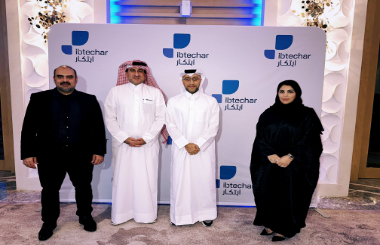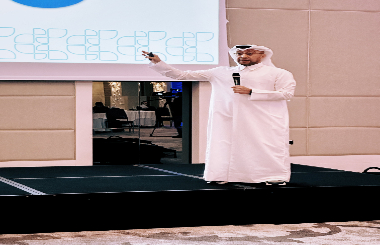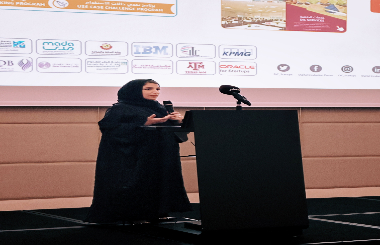Ibtechar, Qatar’s leading practical innovation solutions provider, hosted a roundtable session to discuss national initiatives focused on advancing local innovation skills and stress the importance of these skills towards building a knowledge-based economy in the country.
The session, entitled ‘Developing Local Innovation Skills’, was moderated by Engineer Nayef Al-Ibrahim, CEO and Co-founder of Ibtechar, and featured speakers from the Ministry of Communications and Information Technology (MCIT), Shell Qatar, and Qatar University (QU).
The experts discussed ways to develop innovation skills among the community, highlighting the efforts that have been made in this area. They also explored opportunities to further promote innovation skills, while addressing common challenges that hinder progress.
Opening the session, Engineer Nayef Al-Ibrahim said, "Qatar has outstanding capabilities that enable it to develop excellent local innovation skills. Strategic investment in the past few years has resulted in developed infrastructure, including world-class facilities and communication services that - in addition to the cultural diversity in the community - enriches the innovation ecosystem."
"There are environmental challenges that require developing solutions suitable for the country’s environment and its needs. To this end, we launched ‘Sanea Qatar’, a program that aims to spread the culture of making and discovery among local community members, in 2015. This program seeks to develop the innovation skills of the youth and trains them on how to use modern technologies to create solutions for real-world challenges."
The Sanea program has benefitted over 75 schools, trained more than 6,500 students and 280 teachers to date. As many as 200 projects have been developed under the program, while some of these have garnered regional and international recognition.
Ms. Duha Al-Buhendi, Manager of Digital Incubation Center (DIC), MCIT, spoke about the center’s leading role in promoting innovation and entrepreneurship values in Qatar through digital entrepreneurship. She pointed out that DIC was established to boost ICT innovation in Qatar, particularly among young people at the early stages of setting up a technology-related business in the country.
DIC provides many programs to support innovative projects from the ideation stage until they enter the market, and also when they expand into new markets. The center looks for entrepreneurs capable of harnessing emerging technologies to create innovative products, solutions, or services that will contribute to Qatar’s digital economy,” she said.
“We offer start-ups free office space, technical support, training, guidance and mentors who can help new businesses overcome initial challenges. We also provide start-ups with funding services, exposure and public relations from being a part of the center."
DIC has supported the launch of 160 startups, creating 614 job opportunities. So far, 76 companies have successfully graduated from DIC - with the center currently incubating 60 startups. The total value of funding provided for incubated companies amounts to 205.4 Qatari Riyals, with an average annual investment of 3.614 million Qatari Riyals, Al-Buhendi mentioned.
Engineer Hussein Al-Hejji, Public Relations Director at Shell Qatar, said, "At Shell Qatar, we firmly believe that the future success of the company is based on continuous development and the deployment of new technologies and products. The company invests around USD one billion in research and development programs worldwide.”
“We address the challenges and obstacles that face the oil and gas sector such as carbon emissions and energy transition by looking at ways to offer new solutions for such challenges.In Qatar, we capitalize on our global expertise and knowledge and adapt it to the needs of the local market in support of the Qatar National Vision 2030,” he added.
Cultivating an environment where the younger generation can learn and develop and drive positive impact on society is essential, Al-Hejji said, highlighting Shell’s five pillars for innovation and skills building. These include education, research and development, partnerships, practical application and value creation.
“The company plays an important role in developing local skills by providing training programs, in collaboration with its partners including Ibtechar. Shell Qatar seeks to provide trainees with the necessary tools to embrace new developments, foster the innovation mindset and skills development, while focusing on STEM skills,” he added.
Dr. Mahmoud Abdul Wahid, Secretary of the Board of Directors of Qatar University Holding Company and Director of the Office of Strategic Innovation, Entrepreneurship and Economic Development at Qatar University, emphasized the significant role of universities in accelerating the growth of advanced knowledge-based economies, particularly when it comes to developing knowledge-based companies, innovation start-ups and high-tech companies.
"Developing innovation and entrepreneurship skills and capacities is an essential matter on which universities in Qatar must focus, if they seek to contribute to the development of an innovation-centric society and a knowledge-based economy, as outlined in Qatar National Vision 2030. It pleases me that Ibtechar highlights this topic through this roundtable on local innovation skills, in partnership with governmental, industrial and academic institutions."
To find out more about Ibtechar and its range of innovation-based solutions, visit: http://ibtechar.com/






